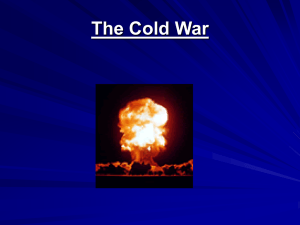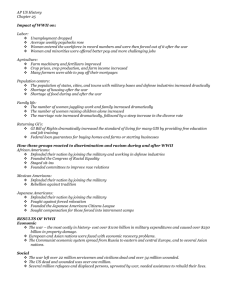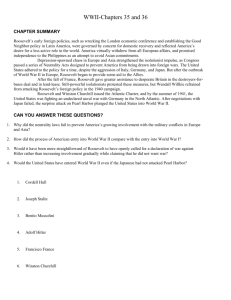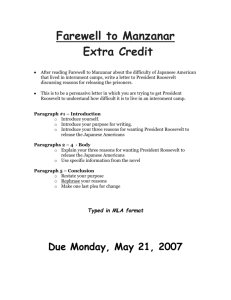Chapter 29 - Prong Software
advertisement
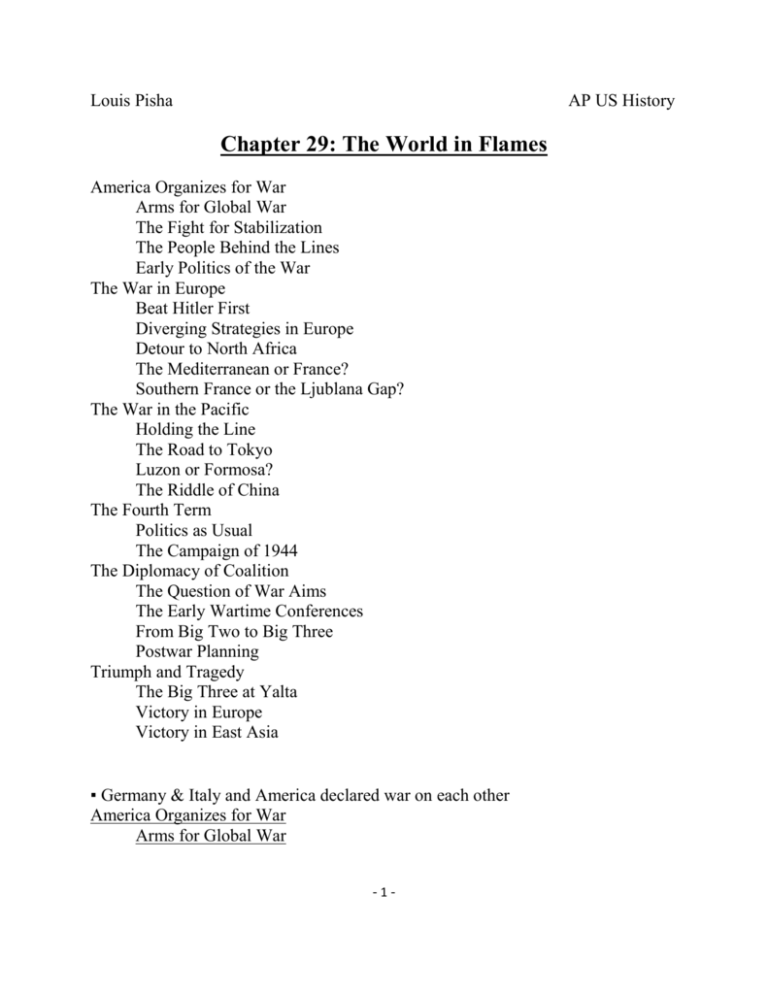
Louis Pisha AP US History Chapter 29: The World in Flames America Organizes for War Arms for Global War The Fight for Stabilization The People Behind the Lines Early Politics of the War The War in Europe Beat Hitler First Diverging Strategies in Europe Detour to North Africa The Mediterranean or France? Southern France or the Ljublana Gap? The War in the Pacific Holding the Line The Road to Tokyo Luzon or Formosa? The Riddle of China The Fourth Term Politics as Usual The Campaign of 1944 The Diplomacy of Coalition The Question of War Aims The Early Wartime Conferences From Big Two to Big Three Postwar Planning Triumph and Tragedy The Big Three at Yalta Victory in Europe Victory in East Asia ▪ Germany & Italy and America declared war on each other America Organizes for War Arms for Global War -1- ▪ Roosevelt set up WPB under Nelson to convert economy to command/mobilized eco ▪ In first half of 1942, government placed $100 billion of goods on order—central control buckled—military demanded control but didn’t get it b/c Controlled Materials Plan ▪Roosevelt also put in War Food Admin, “oil czars,” War Manpower Commission, Office of Scientific Research and Development ▪ Big biz got ever more part of war contracts, which Nelson tried to spread and get smaller companies reconversion privileges, and then he was forced to resign The Fight for Stabilization ▪ How pay for prodigious federal spending? ▪ Broadening and deepening tax structure—41% of expenditures paid for ▪ Rest made up by borrowing—did abolish the depression ▪ Reduced quantity of goods available, yet increased personal income, so inflation ▪ To check this, taxed, sold war bonds, established Office of Price Administration under Henderson ▪ They imposed general price freeze and ration coupons—yet farmers exempt, so food prices went up, so WLB permitted 15% raise in wages—then Stabilization Act established Office of Eco Stabilization under Byrnes ▪ Farm bloc and mine workers demanded exceptions for selves, but prices reached a plateau, and OPA one of war’s successes ▪ Also set up Office of War Mobilization under Byrnes The People Behind the Lines ▪ Surge of popular support, but still anxiety ▪ Except for Japanese, who were deported to internment camps, and the FBI, who was given authority to tap wires in national security cases, there weren’t many flagrant violations of civil freedom that had characterized WWI ▪ Nobody did much to help the Jews, but we didn’t really know about the Holocaust until after we invaded Germany ▪ Moderation atmosphere about civil liberties—no acts of sedition were committed ▪ Increase in pay for all workers and more spread out ▪ Wartime shortages intensified saving, but people lived better lives than depression ▪ More women in labor force or auxiliaries or nurses in army/navy ▪ Discrimination against women receded but not disappeared ▪ Also provided new opportunities but not much less discrimination for blacks ▪ Army and navy persisted in segregation—after Randolph threatened Negro March on Washington, Roosevelt forbid discrimination in defense -2- industries and appointed Fair Employment Practices Committee to enforce that—ended up taking only token steps ▪ Also Congress on Racial Equality which organized sit-ins and freedom rides ▪ Whites objected to blacks moving in and taking their jobs—riots in New York, Los Angeles, and Detroit Early Politics of the War ▪ Conservatives got rid of old New Deal agencies, and Senate Committee to Investigate the National Defense Program under Truman exposed waste and corruption ▪ 1942 congressional election marked by striking Republican gains because of little success in the war The War in Europe Beat Hitler First ▪ Reasons: Germany direct threat to W hemisphere, more likely to achieve some breakthrough in military tech, Great Britain more engaged than China in fighting the enemy ▪ Nazi attack on Russia strengthened likelihood of beating two-front power and necessity to do so before Germany conquered Russia Diverging Strategies in Europe ▪ Br wanted: postpone attack until naval blockade, aerial bombing, psychological war, and border assailment had weakened Germ’s capacity to resist ▪ US felt massive thrust across English Channel into France than Germany would do it Detour to North Africa ▪ Soviets pushing for a cross-channel invasion in 1942, but British wanted to hold off, especially because US not fully mobilized ▪ Decided to make a North African diversion in autumn 1942 to take Germany’s resources away from Russia ▪ Tactical success—local resistance stopped—but N Africa had pledged allegiance to Vichy France, and Roosevelt and Britain supposed de Gaulle would be unacceptable ▪Eisenhower recognized Darlan as de facto political chief in N Africa— assassinated—again denied de Gaulle his authority ▪ Eisenhower in W and Montgomery from E squeezed “Desert Fox” Rommel and he surrendered May 1943 The Mediterranean or France? ▪ Invasion of Sicily and Italy in 1943—reorganized Italian government under Badoglio, who then surrendered, but German troops already there -3- ▪ Allied progress stopped at Monte Cassino—landings at Anzio—failed and Italy held up for a while ▪ Churchill finally consented to May 1944 as target for Overlord—happened June 6—Germans didn’t expect only one attack so able to get a foothold— penetrated quickly and liberated France—then crossed German frontier ▪ Allied air raids badly damaged German morale—also Soviet attacks in E at same time as Overlord—attempt on Hitler’s life ▪ Montgomery urged single decisive thrust into Germy—Eisenhower settled for a “broad-front” strategy of buildup everywhere Southern France or the Ljublana Gap? ▪ Britain had wanted to invade Germ from E through Yugoslavia, but impractical, so invaded S France August 1944 The War in the Pacific Holding the Line ▪ Japan kept attacking after Pearl Harbor—Guam, Wake, Hong Kong, Singapore, Java, Philippines, even threatening India and Australia ▪ Yet Am aircraft carrier fleet kept Australia alive and harassed enemy ▪ Japan sent out expedition across Coral Sea, but US turned them back without seeing them, just battle between aircraft ▪ Then Battle of Midway, Spruance and Fletcher beat bulk of Japanese navy and decisively ruined Japan’s long-range naval strength The Road to Tokyo ▪ Japan also held Bismarck Barrier and Guadalcanal (which US wrested from them after six months of fighting) ▪ Ams argued for and got enough resources for an offensive ▪ Army under MacArthur wanted advance from New Guinea to Philippines to Japan—navy under Nimitz wanted advance from central Pacific to Formosa to China to Japan—ended up parallel offensives ▪ Americans could bypass the strongest Japanese bases because would not largescale reinforce under the nose of the Am aircraft = island-hopping ▪ By March, Nimitz in Guam and Saipan, Macarthur in New Guinea Luzon or Formosa? ▪ MacArthur wanted capture of Philippines, especially since had promised would return—Nimitz wanted attack on Formosa—Roosevelt decided in MacArthur’s favor ▪ Battle of Leyte Gulf, completed destruction of Japanese naval power in largest naval battle in history The Riddle of China -4- ▪Roosevelt wanted to treat China like it was a major power, but Chiang increasingly incapable of anything ▪ Government received trickle of supplies over the Himalayas from India—the Stillwell began road and pipeline across N Burma ▪ Communists won respect b/c discipline, dedication—yet Stillwell couldn’t understand Chiang’s preoccupation with Mao, and ended up fired The Fourth Term Politics as Usual ▪ Congress most conservative in 1942 elections than a decade before—refused to continue National Resources Planning Board, passed Smith-Connally Act to crack down on trade unions—other curtailing of social progs ▪Roosevelt gave ground by saying the war was more important than the New Deal ▪ Liberals became disheartened and found consolation in VP Wallace and Willkie (civil rights champ) The Campaign of 1944 ▪ Thomas E. Dewey and Bricker got Republican nomination ▪Roosevelt nominated as Dem prez, but who VP? Wallace, Byrnes, Truman, Douglas choices, and Truman won ▪Roosevelt forced into the arena and made very successful speech, clinching his election The Diplomacy of Coalition The Question of War Aims ▪ Four Freedoms speech: speech, expression, worship, from want and fear ▪ Atlantic Charter principles signed by multiple nations for victory and human rights ▪ Br and US got along best—Joint Chiefs of Staff—disputes held within framework of reciprocal confidence ▪ Churchill prepared to extensively support Roosevelt’s peace system and UN— repudiation of principles which led to war ▪ UN to keep all world affairs everyone’s biz and reduce barriers to world trade ▪ Russians placed little confidence in UN—instead, balance of power and Communist buffer states ▪ Stalin’s ideology of Communism spreading to capitalist states made Roosevelt try to get personally friendly with Stalin ▪ Stalin went along with British refusal to recognize Soviet conquest of Baltics because wanted second front The Early Wartime Conferences ▪ Tripartite Casablanca conference: future military action in Mediterranean , unconditional surrender -5- ▪ Unconditional surrender did not prolong the war or destroy the populations, nor did it play into hands of Commies From Big Two to Big Three ▪ Meetings in Washington and Quebec--Roosevelt and Churchill for Anglo-Am military questions ▪ Stalin replaced communism with nationalism and dissolved the Comintern ▪ Yet ominous shadows: Soviets refused to relinquish control of part of Poland, conflict in Yugoslavia, Greece—also Roosevelt kept Bomb secret from Stalin, although he knew some things about it ▪ Moscow Conference: affirmed necessity of UN and established European Advisory Committee ▪ Cairo Declaration: strip Japan of conquests, free Korea, return Manchuria and Taiwan ▪ Teheran Conference dealt with European invasion plans Postwar Planning ▪ Fate of Germany: dismemberment? zones of occupation? Latter chosen and divided up ▪ Morgenthau plan for dismantling German industry and turning it into agricultural state—at first Roosevelt liked, but then dropped ▪ US and Br wanted Polish government to accept Curzon and Oder-Neisse lines, Stalin would not accept the London regime—would not aid nonCommunist revolt in Poland ▪ Churchill again visited Moscow, didn’t work out Poland but did SE Europe: Russia interest in Romania, Bulgaria, Hungary, Britain in Greece, Yugoslavia split 50-50—ended up being postwar reality Triumph and Tragedy The Big Three at Yalta ▪ Germans launched attack through Ardennes Forest which resulted in some breakthroughs, but stopped—meanwhile Manila, Iwo Jima, and Okinawa liberated with heavy casualties ▪ Fate of E Europe still unclear, so Big Three met at Yalta in Crimea—agreed on democratic governments with free elections for all of liberated Europe, including Poland—also agreed on occupation for Germany ▪ Also dealt with E Asia, where US wanted Soviet participation especially in invasion of Japan—agreed to join war against Japan after surrender of Germany in exchange for the Kurile Islands, s Sakhalin, Dairen ▪ Also talked about the UN: called charter conference in San Francisco in April— Roosevelt supposed UN would correct the errors of the conferences -6- ▪ Yalta first experiment in postwar political collaboration, and seemed to succeed—neither right-wing or left-wing critics have valid arguments, since Roosevelt took a middle ground at the conference ▪ Military realities set the terms of the agreements—no other choice but war w/ Russia Victory in Europe ▪ Allied armies crossed the Rhine and discovered concentration camps ▪ Soviets had been cooperating with non-Commies against Nazism but now that end was in sight, began to frustrate political freedom in Romania and Poland ▪ Roosevelt died and Truman took over ▪ Churchill argued should race Russians to Berlin, Eisenhower said militarily unsound and wanted to remain good relations with Stalin—Truman hesitated because needed troops in Pacific—Eisenhower refused ▪ Reich falling to pieces, Hitler committed suicide, and German surrender from May 3-8 Victory in East Asia ▪ Japanese resistance ever more fanatical, but sensible people recognized war lost ▪ Manhattan Project built a Bomb by 1945 and Truman knew about it ▪ Many scientists opposed direct military use, instead demonstration to the world— but rejected because only two Bombs ▪ Truman and Attlee issued Potsdam Declaration to Japan to surrender before it was too late—they said it was unworthy of notice ▪ Truman also believed Bomb would increase US’s position in negotiations with Soviet Union ▪ First Bomb dropped—Japanese still refused to accept Potsdam Declaration— Russia joined war against Japan—second Bomb dropped—Japanese military still would not surrender—emperor personally intervened and made them ▪ Would there have been another way? Certainly saved many thousands of American lives in otherwise invasion of Japan—but US now only country ever to have used a Bomb militarily ▪ 25 million deaths during war, 16 million Americans in arms, total casualties 1 million, 300,000 deaths -7-
